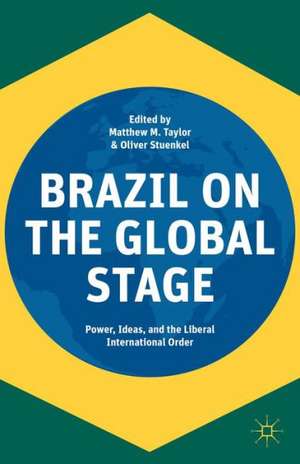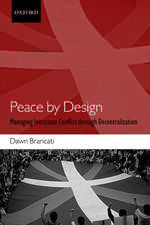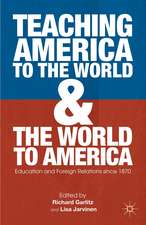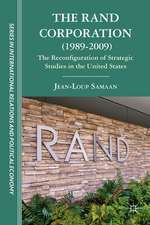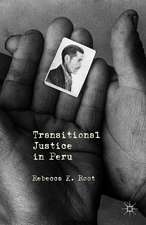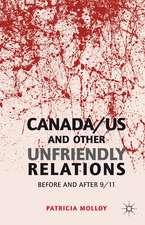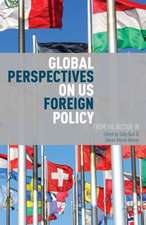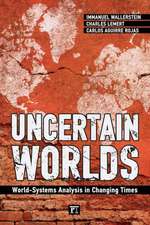Brazil on the Global Stage: Power, Ideas, and the Liberal International Order
Editat de Oliver Stuenkel, Matthew M. Tayloren Limba Engleză Hardback – 24 apr 2015
Preț: 388.90 lei
Nou
Puncte Express: 583
Preț estimativ în valută:
74.43€ • 77.04$ • 62.91£
74.43€ • 77.04$ • 62.91£
Carte tipărită la comandă
Livrare economică 05-19 martie
Preluare comenzi: 021 569.72.76
Specificații
ISBN-13: 9781137491640
ISBN-10: 1137491647
Pagini: 228
Ilustrații: XVII, 228 p. 7 illus.
Dimensiuni: 148 x 210 x 16 mm
Greutate: 0.44 kg
Ediția:2015
Editura: Palgrave Macmillan US
Colecția Palgrave Macmillan
Locul publicării:New York, United States
ISBN-10: 1137491647
Pagini: 228
Ilustrații: XVII, 228 p. 7 illus.
Dimensiuni: 148 x 210 x 16 mm
Greutate: 0.44 kg
Ediția:2015
Editura: Palgrave Macmillan US
Colecția Palgrave Macmillan
Locul publicării:New York, United States
Cuprins
Foreword; Eric Hershberg 1. Brazil on the Global Stage: Origins and Consequences of Brazil's Challenge to the Global Liberal Order; Oliver Stuenkel and Matthew M. Taylor 2. The Rhetoric and Reality of Brazil's Multilateralism; David Bosco and Oliver Stuenkel 3. The Brazilian Liberal Tradition and the Global Liberal Order; João M. E. Maia and Matthew M. Taylor 4. The Risks of Pragmatism: Brazil's Relations with the United States and the International Security Order; Ralph Espach 5. For Liberalism without Hegemony: Brazil and the Rule of Non-Intervention; Marcos Tourinho 6. Brazil's Ambivalent Challenge to Global Environmental Norms; Eve Z. Bratman 7. Brazil and the Global Nuclear Order; Togzhan Kassenova 8. Brazil's Place in the Global Economy; Arturo C. Porzecanski 9. Ever Wary of Liberalism: Brazilian Foreign Trade Policy from Bretton Woods to the G-20; André Villela Afterword: Emerging Powers and the Future of the American-Led Liberal International Order; James Goldgeier
Recenzii
“Brazil on the Global Stage … will be of paramount interest to scholars of emerging powers, the global liberal order and America’s role in it, international institutions, and Brazil itself. … Held together by a clear common focus throughout the volume, these contributions amount to a convincing picture of Brazil as a rising power that … is held back from doing so by the inherent inequalities in the international system that interfere with their just implementation.” (Dana Zartner, International Relations, Vol. 14 (4), December, 2016)
“Stuenkel and Taylor have done an admirable job putting together a key collection of background primers on contemporary Brazilian foreign policy. Readers grappling with Brazil’s growing role in the world would be well advised to include this book on their reading lists if they wish to add an important level of nuance and context totheir understanding of Brazilian foreign policy.” (Sean W. Burges, International Affairs, Vol. 91 (6), 2015)
“Stuenkel and Taylor have done an admirable job putting together a key collection of background primers on contemporary Brazilian foreign policy. Readers grappling with Brazil’s growing role in the world would be well advised to include this book on their reading lists if they wish to add an important level of nuance and context totheir understanding of Brazilian foreign policy.” (Sean W. Burges, International Affairs, Vol. 91 (6), 2015)
Notă biografică
Oliver Stuenkel is Associate Professor in the School of International Relations at Fundação Getulio Vargas (FGV), Brazil.
Textul de pe ultima copertă
In the past generation, Brazil has risen to become the seventh largest economy and fourth largest democracy in the world. Yet its rise challenges the conventional wisdom that capitalist democracies will necessarily converge to become faithful adherents of a US-led global liberal order. Indeed, Brazil demonstrates that middle powers, even those of a deeply democratic bent, may differ in their views of what democracy means on the global stage and how international relations should be conducted among sovereign nations. This volume explores Brazil's postures on specific aspects of foreign relations, including trade, foreign and environmental policy, humanitarian intervention, nuclear proliferation and South-South relations, among other topics. The authors argue from a variety of perspectives that, even as Brazil seeks greater integration and recognition, it also brings challenges to the status quo that are emblematic of the tensions accompanying the rise to prominence of a number of middlepowers in an increasingly multipolar world system.
